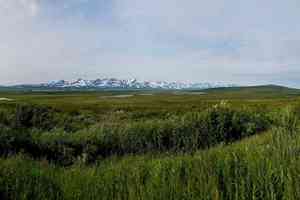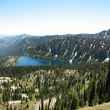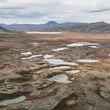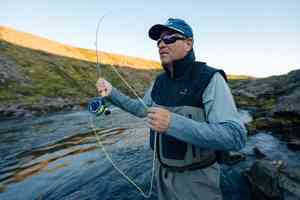When President Joe Biden first sat down in the Oval Office a year ago, the nation’s environmental regulatory framework was in shambles. His predecessor, Donald Trump, had put tremendous energy into shrinking national monuments, eviscerating environmental protections and removing so-called “regulatory burdens” from the back of extractive industries. As a lame duck, Trump intensified his environmental rampage by selling drilling rights in the Arctic National Wildlife Refuge, removing critical habitat protections for the northern spotted owl, allowing industry to kill migratory birds without consequence, approving a four-lane highway through a southwestern Utah desert and finalizing a deal that handed over Apache homelands to a global copper-mining company.
Biden, however, appeared uncowed by the destruction: Within hours of his inauguration, he signed a flurry of executive orders under the heading of “protecting public health and the environment and restoring science to tackle the climate crisis.”
But over the ensuing 12 months, his administration hasn’t always lived up to that initial promise. Biden’s first year is “a mixed bag, at best,” said Erik Schlenker-Goodrich, the Western Environmental Law Center’s executive director. He believes the administration has intentionally eased back on executive actions in hope of securing more lasting legislation from Congress. But by doing so, Schlenker-Goodrich said, Biden has failed to realize those bold early promises.
Biden has often seemed torn between following the advice of his notably progressive appointees, including Interior Secretary Deb Haaland and Bureau of Land Management Director Tracy Stone-Manning, and attempting to curry favor with senators like Republicans Lisa Murkowski and Mitt Romney and the fossil fuel-friendly Joe Manchin. This conflict has resulted in what can seem like a “two steps forward, one step back” policy pattern. Biden revoked the Keystone XL pipeline permit but supported the equally troubling Dakota Access line. He suspended oil and gas leases in the Arctic National Wildlife Refuge but backed Trump’s approval of ConocoPhillips’ Willow drilling project, also in Alaska. He halted construction on the U.S.-Mexico border wall, but instead of removing it altogether, he allocated funds to fill in the gaps on existing sections.
It was, for Biden, a year of herky-jerky, back-and-forth environmental progress:
Step forward: The administration rescinded Trump’s approval of the Oak Flat land exchange, delaying the transfer of historically and ceremonially significant lands to a global mining conglomerate. Step back: But when Apache Stronghold, a nonprofit devoted to protecting sacred sites, asked the 9th Circuit Court of Appeals to halt the exchange on the grounds that privatizing and destroying Oak Flat with mining and the resulting subsidence would violate the Religious Freedom Restoration Act, the Biden administration argued against those claims, saying, “Only Congress can provide the relief the Plaintiffs seek.”
Two steps forward: Months after Haaland delivered her recommendations on the shrunken national monuments, Biden finally used the Antiquities Act to restore the original boundaries of Grand Staircase-Escalante and Bears Ears. He also beefed up their proclamations, and opened the door to grazing buyouts and permanent retirement of grazing leases. One step back: While the grazing retirements were seen as a victory for those looking to reduce or end ranching on public lands, it was offset by the administration’s inclusion of ranchlands as conserved areas under its 30x30 initiative. Biden also failed to hike grazing fees above the $1.35 per animal unit month minimum.

Three steps forward: Biden rolled back Trump-era orders on “energy dominance,” and continued to walk the talk in many ways: He paused oil and gas leasing on public lands, restored and strengthened the methane-emissions rules gutted by Trump, and proposed a 20-year ban on oil and gas leasing within 10 miles of Chaco Culture National Historical Park. Two steps back: At the same time, his BLM continued to hand out drilling permits at a pace not seen since George W. Bush. It also issued a review of the oil and gas leasing program that recommended modest reforms and royalty rate hikes but made no effort to overhaul the program or to use reforms to tackle climate change.
One step back: After a judge ruled the oil and gas leasing moratorium illegal, the administration announced that it would lease hundreds of thousands of acres of Western public lands. A half-step forward: But it then removed many of the nominated parcels from the block, citing the potential impacts to sage grouse and other wildlife. In Wyoming, for example, only 195 of 459 parcels being considered will be auctioned.
A big step forward: Biden set the most ambitious environmental justice agenda ever by a U.S. president. A step back: The brains behind that agenda, Cecilia Martinez, stepped down from her post as senior director for environmental justice at the Council for Environmental Quality early this month.
A step forward: Biden’s Interior Department launched a review of the outdated federal coal leasing program, even as it stepped back by significantly reducing royalty rates for coal companies, which raked in millions in profit during 2021.
Three steps forward: The administration restored Trump-revoked protections for Alaska’s Tongass National Forest, revived enforcement of the Migratory Bird Act and restored the Navigable Waters Protection Rule.
A (hesitant) step forward: After pressure from environmental groups, the U.S. Fish and Wildlife Service backed off a plan to revoke protections for the Canada lynx.
A step forward: The BLM moved its headquarters from Grand Junction, Colorado, where it was relocated in 2019, back to Washington, D.C., in an effort to rebuild the beleaguered agency.

A couple steps forward for the climate, but a step backward for the desert and the ocean: The Interior Department kept its promise to accelerate renewable energy development on public lands by approving a handful of large solar plus storage installations in the Mojave Desert and by planning an offshore wind lease sale along California’s coast.
If Biden’s waffling on some issues was meant to gain concessions from the Senate, his success there was mixed, as well. Congress passed the Infrastructure and Jobs Act, handing Biden a major legislative victory. But the more climate-oriented Build Back Better Act — which contained provisions banning drilling in ANWR, reforming oil and gas leasing, and so forth — continues to languish, thanks in part to Manchin’s intransigence.
The administration’s erratic policymaking may be partly in response to today’s overwhelming challenges: a pandemic that won’t go away, inflation and rising gasoline prices, obstructionist Republican lawmakers and the need to clean up all the wreckage Trump left behind. “And in the face of that dynamic, the White House … is pumping the brakes because they fear that taking bold, visionary action will backfire,” Schlenker-Goodrich said.
The White House … is pumping the brakes because they fear that taking bold, visionary action will backfire.
“But fear is a terrible driver of sound strategic thinking and action. You gotta play to win and trust the people you put on the field to win it for you,” he went on. “In the fight to protect our public lands from the profit-driven ravages of oil and gas companies, trade associations, and investors, the administration is losing.”
This story originally appeared in High Country News and is part of Covering Climate Now, a global journalism collaboration strengthening coverage of the climate story.

































Comments
Glenn Dotter replied on Permalink
Again, interesting article from hypocrits. Same people want to drive cars and trucks, but dont want oil or coal. We were energy independent under Trump and gas was a buck fifty. Biden now begs Opec and Russia to produce more oil while wee pay nearl 4 bucks for gas and some pleces 5&6 bucks. You condem coal but it still contributes to the grid that you electric vehicle folks think are so great.
None of you hesitate fly to places to fish. How many of you live off the grid like I have for 30 years? I drive a max of 3-4 hours to fish and cannot fish all that water in my lifetime. You condemn biden and trump, but you are part of the climate problem unless you dont believe its real but other folks should do what you say.
I dont see you folks condemning India & China for being the worst polluters on the planet. How many of you hold investments that include oil, gold, copper, silver, eithe direct mining or the use of those product.
Take a look in the mirror as you condemn companies that make the products everyday
Hypocrit!
Chad Shmukler replied on Permalink
Unfortunately, there are numerous inconsistencies in your post, Glenn.
- The U.S. is a net exporter of *both* oil and gas. That was true before Trump took office, and it remains true now. Nothing about America's "energy independence" has changed one lick with Biden in office. Furthermore, Biden is approving public lands drilling permits faster than the Trump administration did.
- India and China are not the "worst polluters on the planet." The U.S. and China are. China is the #1 carbon emitter, followed by the U.S. In terms of responsibility for the total amount of CO2 in the atmosphere, however, the U.S. is far and away the leading polluter in that regard.
Roger Lahti replied on Permalink
Regardless of what good or bad Biden has done for the environment, it’s unarguably true he has practically destroyed this country by his decisions and either actions or inactions. He isn’t worth it.
Theo replied on Permalink
Hey Jonathan. Do you use graphite rods or bamboo exclusively?
Glenn Dotter replied on Permalink
So 2 "inconsistencies" are numerous. Ok. My point was that it seems when fishermen and women who talk of climate change and shutting dow oil drilling and mining operations, want to go fishing, its ok for them to hop on a plane and spew carbon because its ok if they want to. Let he (or she) who is without sin, cast the first stone.
Paul replied on Permalink
Biden may be doing the cha-cha move on natural resources protection but it is far, far better than Trump ever did during his tenure. The guy was a one man wreaking crew! Protection of our natural resources isn't a zero sum game as some would like us to believe. We can have our modern conveniences and still offer substantial protections of our natural resources. It's the corporate greed to turn a buck that needs to stop! Trump embodied that greed and still does.
Pages